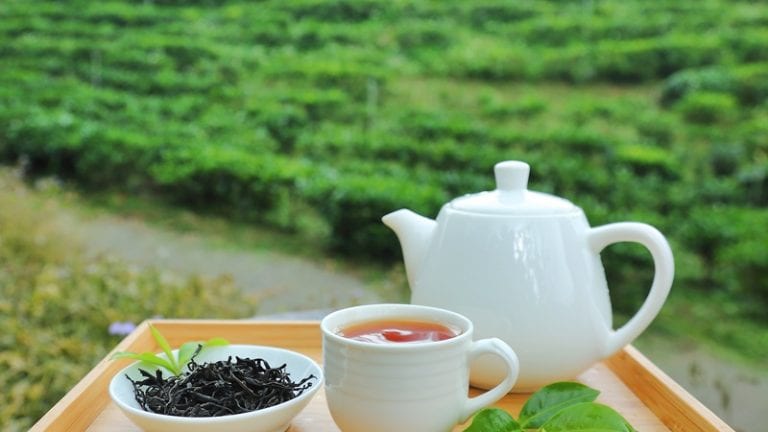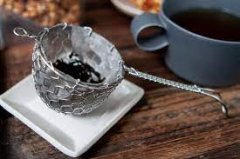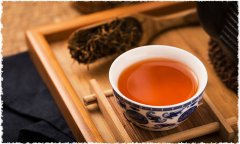What is the taste of Taicha No. 18 Hongyu black tea? is Yuchi black tea Riyue Lake black tea expensive?
In 1926, the first Assam variety was introduced and planted on the hills around Riyue Lake in Nantou County. The climate, environment and soil of the lake are considered to be the most similar to the Assam tea garden in India. Today, most of Taiwan's black tea produced by Riyuetan comes from three different varieties: a purebred Assam, a local variety, and a hybrid called No. 18.
On the 18th, the purebred Assam was crossed with the local variety. No. 18, which is called "Hongyu" or "Taiwan Tea No. 18" by local Taiwanese, is the result of nearly 50 years of research by Taiwan Tea Research and Promotion Station. This particular harvest is also bitten by aphids, triggering a natural enzyme reaction in plants, producing what we call a "honey fragrance".
This kind of tea is organically grown and produced in Yuchih village on the edge of Sun Moon Lake. The leaves were picked in the early morning in mid-May. Then, they naturally wither, roll, scratch and oxidize on a covered bamboo tray until they are roasted, roasted and dried the next day.
The result is one of the most wonderful teas we have ever tasted. Because of the natural sweetness of the bug-bitten crop, it tastes like black tea with cream and sugar. However, this tea is also smooth and complex, rich with hints of roasted chestnuts, honey and roses.
Varieties and picking methods
In the early days of black tea cultivation in Taiwan, the main varieties were Chinese varieties with small leaves. It was not until 1917 that the Japanese began to introduce Assam varieties from India. After a series of studies, it is found that the environment and climate of Sun Moon Lake in Yuchi Village are very similar to those of Assam Tea Garden in India. As a result, Assam varieties were first planted in the region. The quality of black tea makes it have excellent cup-shaped characteristics, which has attracted wide attention at the tea auction in London. In Japan, it used to be a gift to the royal family and distinguished guests. Therefore, the Sun Moon Lake area is considered to be the cradle of Taiwan's black tea.
In Riyuetan area, Taiwan Tea Research Institute has developed Formosa black tea after more than 50 years of variety research. This is a unique variety, bred by a cross between the existing Taiwan native variety and the Assam variety from Myanmar. This may be why some people who have tasted this tea say its taste is reminiscent of Assam tea. It is named Taiwan Variety 18. Among several kinds of black tea in Taiwan, Formosa black tea is of the best quality. Because of its highly cherished characteristics, it has attracted much attention in both local and international markets. With its outstanding cup nature, it has once again promoted the revival of Taiwan's black tea production after it was abandoned for a long time after World War II.
At present, this kind of tea is grown in only about 10 hectares of tea garden in Yuchi village. As supply fails to meet domestic demand, it is often difficult to ensure inventory.
The elevation of the tea garden is relatively low, and the temperature is about 23 degrees Celsius. Picking takes place from spring to summer. When picked by hand, each branch consists of a bud and two to three leaves.

[taste]
Mellow, silky, without a hint of astringency.
[aroma]
Mint aromas with hints of cinnamon and maltose. It also reminds us of brandy, while some people think it is like dessert tea because it gives people a complex flavor of chocolate and vanilla.
[dried leaves]
The twisted dried leaves have a silky appearance. The size of the leaf can be up to 5 cm. When you touch the brewed leaf, it is very soft and elastic. The color is the same, brown, no black spots, indicating that it is a good tea made from fine processing.
[tea]
Bright red
Important Notice :
前街咖啡 FrontStreet Coffee has moved to new addredd:
FrontStreet Coffee Address: 315,Donghua East Road,GuangZhou
Tel:020 38364473
- Prev

Which is the better difference between Zhengshan race and Laocong black tea? the taste characteristics of what kind of tea does the smoking race belong to?
Other historical puzzles about black tea it is said that, in any case, one of Jiang's great ancestors asked for the tea to be dried and sent to the market. Unexpectedly, foreign businessmen became interested in this completely different kind of tea. They not only bought all the tea, but also paid for the whole harvest next year. The details of the story are a little confusing, and some people say that these events are
- Next

Yingde black tea Yinghong No. 9 black tea which grade is the most expensive and what are the varieties of Guangdong black tea
Have you ever heard of Golden Circle? When Guangdong black tea is filled in a white container, you will see a golden halo on the edge of the tea. However, this gold ring is not suitable for any black tea. Only well-made black tea contains a yellow pigment called TF. If black tea contains a sufficient amount of TF, there will be a golden circle. This substance gives people a very mellow and sweet
Related
- Unexpected! Ruixing Telunsu lattes use a smoothie machine to foam milk?!
- % Arabia's first store in Henan opens into the village?! Netizen: Thought it was P's
- Does an authentic standard mocha coffee recipe use chocolate sauce or powder? Mocha Latte/Dirty Coffee/Salty Mocha Coffee Recipe Share!
- What is the difference between Vietnam egg coffee and Norway egg coffee? Hand-brewed single product coffee filter paper filter cloth filter flat solution!
- What is the difference between sun-cured and honey-treated coffee? What are the differences in the flavor characteristics of sun-honey coffee?
- How to make Italian latte! How much milk does a standard latte use/what should the ratio of coffee to milk be?
- How to make butter American/butter latte/butter Dirty coffee? Is hand-brewed coffee good with butter?
- Is Dirty the cold version of Australian White? What is the difference between dirty coffee/decent coffee and Australian white espresso?
- Relationship between brewing time and coffee extraction parameters How to make the brewing time fall to 2 minutes?
- Got entangled?! Lucky opens a new store, Mixue Ice City, and pursues it as a neighbor!

